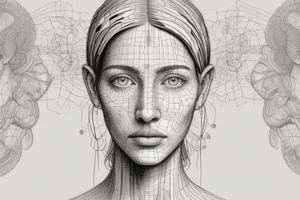Podcast
Questions and Answers
Which aspect best defines self-concept?
Which aspect best defines self-concept?
- The process of selecting appropriate behaviors in social contexts
- The ability to monitor social interactions
- The awareness of one's own identity and beliefs (correct)
- The understanding of emotional cues from others
What is a key influence on self-esteem?
What is a key influence on self-esteem?
- Genetic factors and family traits
- Workplace achievements and income levels
- Physical appearance and fashion choices
- Social cues and feedback from others (correct)
The concept of 'thin slices' in person perception refers to:
The concept of 'thin slices' in person perception refers to:
- Quick judgments made based on limited information (correct)
- Detailed analysis of personal backgrounds during introductions
- Responses to social interactions over extended periods
- Deep understanding gained from prolonged observation
Which of the following is NOT a component of self-presentation?
Which of the following is NOT a component of self-presentation?
Attribution theories aim to explain how individuals:
Attribution theories aim to explain how individuals:
Self-verification refers to the process of:
Self-verification refers to the process of:
The covariation model is used in attribution theory to understand:
The covariation model is used in attribution theory to understand:
What role does cultural context play in self-concept development?
What role does cultural context play in self-concept development?
Flashcards are hidden until you start studying
Study Notes
Social Psychology
- Humans are inherently social, influencing behaviors and interactions within groups.
- Social psychology examines how individuals think, feel, and behave in social contexts.
- Common sense sometimes aligns with psychological principles, but scientific methods provide deeper insights.
Cultural Psychology
- Emphasizes the importance of culture in shaping psychological processes and self-concept.
Research Methods
- Utilizes various methodologies including experiments, surveys, and observational studies to gather data in social psychology.
Self-Concept
- Self-concept refers to how individuals perceive themselves, shaped by personal and social experiences.
Origins of Self-Concept
- Introspection involves self-reflection to understand personal thoughts and feelings.
- Forecasting pertains to how future events may influence self-perception and identity.
Culture and Self-Concept
- Cultural background affects how individuals view themselves and their roles in society.
Sources of Self-Concept
- Influenced by factors like feedback from others, social roles, cultural expectations, and personal experiences.
Self-Esteem
- Refers to an individual's overall sense of personal value and worth.
- Can be affected by achievements, social interactions, and personal evaluations.
Self-Presentation
- The process of controlling or influencing how one is perceived by others.
- Involves aspects of impression management and social desirability.
Self-Verification
- The motivation to maintain a consistent self-view, seeking affirmation from others.
Self-Monitoring
- The ability to adjust one's behavior based on social contexts and the expectations of others.
Person Perception
- The process of forming impressions of others based on appearance, demeanor, and behavior.
Thin Slices & Physical Appearance
- People make quick judgments about others based on minimal information, often focusing on physical traits.
Perceiving Situations
- Context significantly alters interpretations of situations and behaviors.
Mind Perception
- Refers to how people attribute mental states and intentions to others, impacting interpersonal interactions.
Non-Verbal Behavior
- Non-verbal cues (body language, facial expressions) play a crucial role in communication and interpretation of emotions.
Deception Detection
- Challenges in identifying deceptive behaviors often arise from reliance on non-verbal signals.
Attribution Theories
- Focus on how individuals explain the causes of behavior: whether attributing to internal characteristics or external situations.
Covariation Model
- A framework for understanding attribution that considers the consistency, distinctiveness, and consensus of behaviors.
Jones & Harris (1967)
- A study demonstrating fundamental attribution error where participants underestimated situational influences on behavior.
Attribution Errors
- Common mistakes include overemphasizing personal traits and underestimating situational factors in explaining behaviors.
Studying That Suits You
Use AI to generate personalized quizzes and flashcards to suit your learning preferences.




